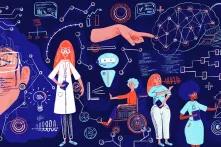Robotics, AI and Gender

Rapid developments in artificial intelligence (AI) technology and new forms of human-machine interaction bring about transformative changes in work, industries, creativity, labour, and even intimacy. Human communication has been "datafied" and mediated by technology, and new rules of engagement need to be found.
For those concerned about promoting gender equality, and making societies more inclusive for females and non-binary genders, the design, implementation and use of gender features in robots are extending gender and power relationships to new parameters. Choices should be carefully made in order to reduce old oppressions and inequalities, instead of proliferating them to new heights and forms.
This small collection of essays presents some of the existing and upcoming challenges. Jeffrey Chan discusses ethical issues arising from the way how AI chatbots complicate social communications. Katharina Klappheck examines AI’s intricate layers of power dynamics that leads to gender and racial invisibility, exclusion, and labour exploitation. Finally, Aifric Campbell explores the future of love and intimacy as our attention to humans is seduced by machines. These are just steps in the direction of a broader discussions to fine-tune the design and governance of new technologies to embrace inclusivity, gender justice and human values in a brave new world.
This collection has emerged from contributions to the 6th International Conference on Artificial Intelligence Humanities (ICAIH), a conference hosted by the Humanities Research Institute (HRI) at Chung-Ang University in Busan, South Korea, in June 2023. hbs Hong Kong is happy to have co-organised two panels at this conference, on “Designing Digital Gender”, and “AI, Communication, and Reality”, respectively. We wish to give sincere thanks to the HRI of Chung-Ang University, to Gunda Werner Institute, and to panel speakers who provide web articles for this follow-up dialogue.


